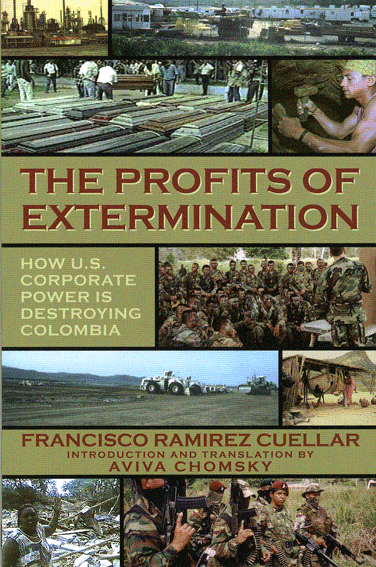http://www.commondreams.org/views05/0623-29.htm
| Published on Thursday, June 23, 2005 by Working for Change |
| Plan Colombia Up for a Vote: Take the Opportunity to Say No to a Forgotten, Senseless War |
| by Geov Parrish |
| Amidst the disaster that is Iraq, the Pentagon has been fighting a smaller but no less ugly war. Next week, Congress will decide whether to continue sending military aid to Colombia, a country with one of the worst human rights records in the western hemisphere. The focus of the aid is Plan Colombia, a five-year-old plan that has poured billions of U.S. dollars into drug crop fumigation and military aid. The plan expires this year, and needs Congressional approval to continue. It's a rare opportunity to impact U.S. warmaking -- yet, in part because of the subsequent, problematic invasions of Afghanistan and Iraq, there has been virtually no U.S. media attention on what our tax dollars are assisting in Colombia. One of the most troubling incidents there happened in February, when eight members of the Peace Community of San José de Apartadó were massacred, including four children. One of the victims was community leader and founder Luis Eduardo Guerra. Evidence points to the Colombian army as the authors of this crime. The San Jose de Apartado massacre is consistent with past years, when human rights groups like Amnesty International and Human Rights Watch have relentlessly accused the Colombia Army of having extensive links to right wing paramilitary death squads. Those death squads have primarily attacked civilians rather than the government's civil war opponents, the leftist guerillas of FAR C. Those guerrillas are the main reason Plan Colombia's aid has steadily shifted from drug-interdictment to the even messier business of being directly involved in Colombia's long running, 45-year-old civil war. Next week's vote will be the first time Plan Colombia itself, rather than budgetary allocations for it, will come up for a Congressional vote -- and the first time that Plan Colombia will have come up for a vote in the context of the War on Terror. To that end, the Bush administration has actually been painting FARC as a terrorist threat to the U.S. -- even though no evidence for such outlandish claims exists, and FARC has had 45 years to declare that the U.S. is a target. Instead, they are very much focused on the urban areas of Colombia, being concentrated in the jungle areas of Colombia's south and east. There are a lot of good arguments for Congress to consider as to why involving the U.S. in yet another war, this one in Colombia, is a bad idea. In the midst of a War on Terror, the U.S. can little afford, in terms of either money, military aid, or troop strength, to get involved in yet another war. Colombia has nothing to do with the war on terror -- militarily. But it does have something to do with swaying hearts and minds in the Muslim world. Every time that the U.S. is caught acting like a bully in the world, especially among the world's poorest, that fact is noted by Muslims from Morocco to the Philippines.. In order to shift the catastrophic momentum in Iraq, the U.S. must first convince the Iraq people -- and the rest of the Muslim world -- that the U.S. is sincere in its protestations that it is a force for justice and good. That's a hard case to make if Congress is cozying up to paramilitary thugs in Colombia. This vote also presents a rare chance for constituents to contact members of Congress and urge a stop to the Pentagon's war by prosy. Call your Representative at 202-224-3121 and urge them to support any amendments to the FY2006 Foreign Operations Appropriations Bill that cut military aid to Colombia and continue to support additional humanitarian assistance and a negotiated path toward peace. The Colombian military does not either deserve or merit U.S. military support. It's time to stop our blind allegiance to war as a way to solve political problems, particularly in countries where we have an interest in promoting democracy -- not more needless bloodshed. Say no to Plan Colombia. This week is your chance. Geov Parrish is a Seattle-based columnist and reporter for Seattle Weekly, In These Times and Eat the State! He writes the daily Straight Shot for WorkingForChange. © 2005 Working Assets |

